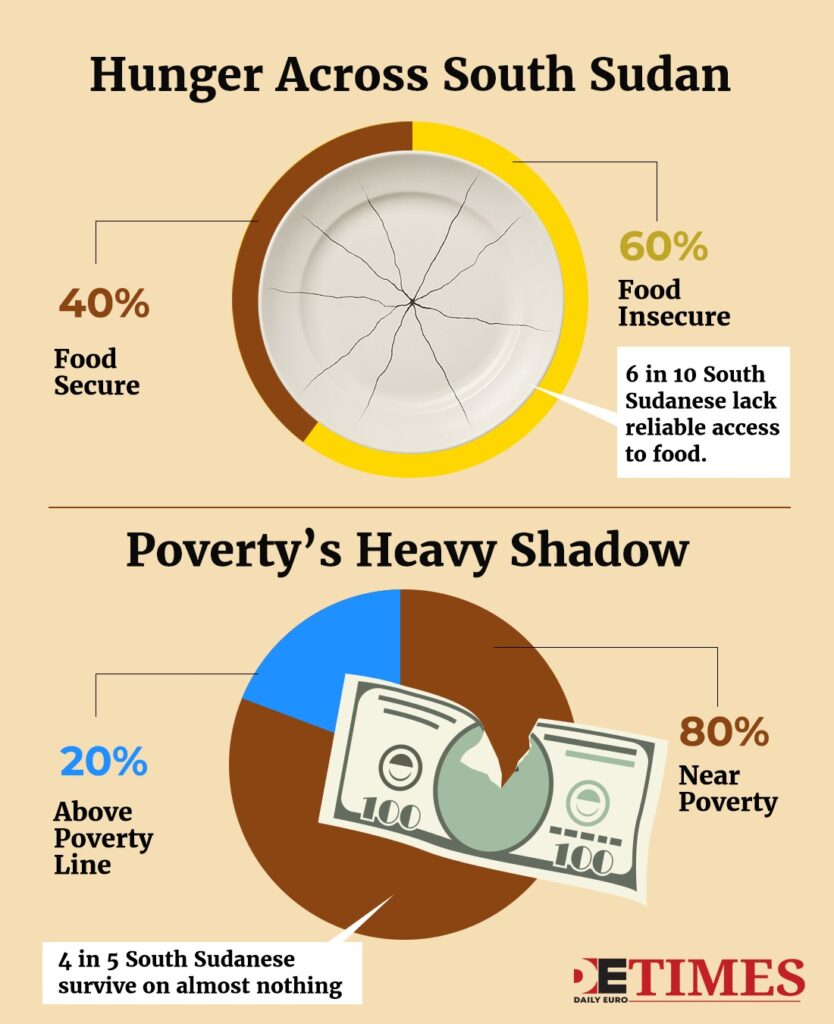Violence against civilians in South Sudan jumped by 51 per cent in 2024, UN Mission figures show. Poor timing for a country drowning in economic chaos.
War crimes trials seem pointless to South Sudanese families scraping by each day. These legal cases unfolding across the region matter for a nation where over 400,000 people died between 2013-2018 during civil war.
The International Criminal Court wrapped up closing statements in December 2024 for Sudan-related cases, while Uganda handed down its verdict against former commander Thomas Kwoyelo in August 2024.
Courts Don’t Fill Empty Stomachs
South Sudan’s economy crashed by 24.5% last year after oil pipeline breaks in February 2024 stopped crude exports.
The country relies on Sudan’s roads and pipes to ship its oil through Port Sudan. War kicked off in Sudan in April 2023, making South Sudan an economic prisoner to its northern neighbour’s mess.
Oil output fell from 150,000 barrels per day in 2023 to 90,000 barrels per day by March 2024; government money dried up overnight.
Farming doesn’t help. About 60 percent of people go hungry while nearly 80 percent scrape by on almost nothing, World Food Programme and World Bank numbers show. Farmers who try growing crops watch armed groups or desperate families destroy their harvests.

Money Troubles Ease Despite Legal Mess
Economic predictions look brighter for 2025.
South Sudan's economy should bounce back by 17% in 2025 as oil exports started up again in January after Sudan dropped its ban on crude transport. Recovery stays shaky and depends on peace in Khartoum.
Years of stealing and hiding oil money made the oil crisis worse. The government’s addiction to oil cash leaves the country wide open to trouble from nearby wars.
International justice keeps grinding away slowly. Finishing trials means progress, even if verdicts take months or years.
Nearby Trials Matter
Some folks say chasing war crimes cases takes focus away from people who need help now. Why waste money on courts while people lack food and medicine?
Uganda’s guilty verdict for Thomas Kwoyelo proves local courts can deliver justice for mass killings. These examples count for South Sudan, where many killers still walk free. Legal payback stops future violence and protects ordinary people.
Building Peace Needs Money and Justice
Instead of picking between justice and development, South Sudan needs both.
The World Food Programme needs $274 million to keep going through December 2025 but can only help 30 percent of starving people because donors won’t pay up.
World partners should link aid money to real government fixes. Oil cash must flow openly to schools and hospitals, not private bank accounts. Farm programs need guards against armed meddling.
Trading with neighbours offers another way out. South Sudan could ship goods through Kenya and Ethiopia instead of depending only on Sudan’s broken systems.
Oil exports starting up again gives breathing space for recovery. Better government finances must let officials spend more on health, schools and countryside development to fix what causes fighting.
War crimes convictions mean nothing if the problems that start conflicts stay the same. South Sudan’s biggest test isn’t happening in courtrooms but in turning oil wealth into real prosperity for its beaten-down people.
Keep up with Daily Euro Times for more updates!
Read also:
Sudan’s Emergence as a New Captagon Hub
El Fasher in Crisis: Genocide Under the RSF
Nile Tensions: South Sudan at Risk of Renewed Conflict






